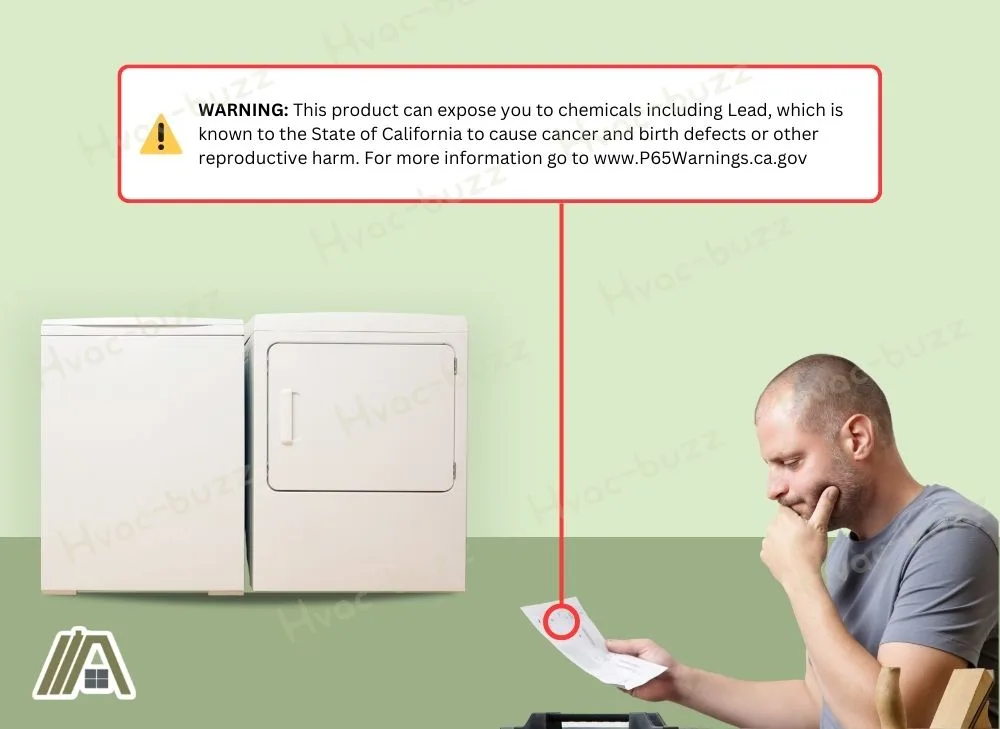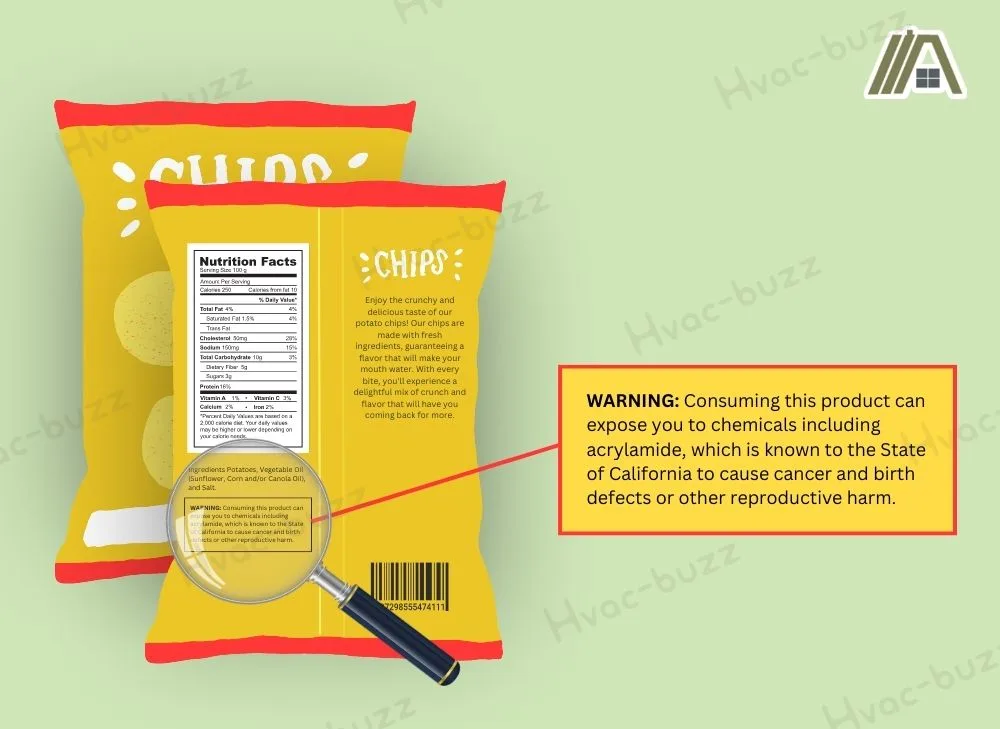When shopping for a dryer, you’ll come across the phrase “Proposition 65 Warning for California Residents.” Prop 65 is another name for the California Safe Drinking Water and Toxic Enforcement Act of 1986. This law requires warnings for products that contain any of the chemicals listed under Prop 65.
Why dryers come with a Prop 65 warning is less obvious than, say, a cleaning product. However, it serves as an excellent example of just how extensive the Prop 65 chemicals list is, which is actually slightly controversial.

Almost all dryers have Prop 65 warnings. They warn about natural gas (for gas dryers) and lead in PVC insulation (electric dryers). These substances are usually not a concern if the dryer is used correctly.
What Prop 65 Chemical is Present?
Prop 65 lists over 900 chemicals that have been demonstrated to cause cancer, birth defects, and/or other reproductive harm in certain quantities and contexts.
In gas dryers—and any gas appliance—the most common Prop 65 chemicals are benzene, carbon monoxide, and formaldehyde. Natural gas contains benzene, and the process of burning natural gas produces carbon monoxide and formaldehyde.

Electrical wiring and cords are often insulated using PVC (polyvinyl chloride). Lead and phthalates are Prop 65 chemicals that can be present in PVC and/or the making of PVC. PVC insulation can be used in all types of dryers—gas, electric, and heat pump.
Some dryer filters are made of polyester. Polyester contains titanium dioxide and ethylene glycol, which are known to the state of California to potentially cause cancer and reproductive harm. This is a great example of how broad Prop 65 can be.
Different Prop 65 chemicals will be present in different parts of the dryer. An important thing to consider is whether the chemical will come into contact with your clothes.
The main chemicals associated with gas dryers are linked to the ventilation system (and can be mitigated by proper ventilation). Similarly, the lead and phthalates associated with electrical wiring won’t come into contact with your clothes.
The only one of the above-mentioned chemicals that would touch your clothes is the compound found in polyester filters. However, many of your clothing items may already have polyester in them.
Do All Dryers Have a Prop 65 Warning?
Technically, not all dryers have Prop 65 warnings, but the vast majority do.
A dryer that contains Prop 65 chemicals still might not be labeled with a warning if it is not sold in California. However, manufacturers still tend to put Prop 65 warnings on appliances in case they make their way to California.
All gas dryers have Prop 65 warnings for the benzene, carbon monoxide, and formaldehyde linked to natural gas. Electric dryers do not need warnings for those specific chemicals.
While most electric and heat pump dryers have Prop 65 warnings for PVC wiring, not all PVC contains enough lead for a warning.
For some chemicals, Prop 65 specifies the quantity at which a warning is required. Some companies err on the side of caution by putting a Prop 65 label on any product that contains chemicals even below the specified threshold. Other companies do not attach a warning unless absolutely necessary.
Prop 65 warnings exist across all brands. A tiny handful of electric dryers happen to not have warnings, for example the Speed Queen DR7 Electric Dryer (DR7003WE). The manufacturer says that the lead levels in the PVC are low enough in the DR7.
Brands do not advertise these dryers as safer than Prop 65 dryers; dryers without Prop 65 warnings are not usually a category in consumer rankings.
This lack of public concern is consistent with the fact that Prop 65 warnings are widely accepted as legally required but not always practically meaningful.
In other words, a Prop 65 warning does not necessarily mean that an appliance is likely to cause harm.
Should I Be Worried?
Prop 65 warnings do not always say which chemicals are present or how much is present. The law is often criticized for not differentiating between low- and high-risk. A Prop 65 label could apply to both potato chips and chemotherapy.

The Prop 65 list is extensive and includes substances found in everyday objects, from polyester to wood dust to Ikea furniture.
Additionally, the Prop 65 list does not provide quantity limits for all chemicals, so even a tiny amount needs a warning. Prop 65 often does not line up with national regulations, so even a quantity considered safe by the FDA or EPA might need a California warning.
Levels of lead and phthalates in PVC insulation are low enough that they are not a concern if you use your dryer as instructed. You won’t touch the cord or internal wiring very often. In fact, PVC insulation is important as it makes the wiring more efficient and less flammable.
For smaller items that you handle more often—like a hairdryer or handheld blender—touching the cord could expose you to lead more frequently. It is recommended to wash your hands after handling Prop 65 cords.
For gas dryers, buyers will not be exposed to harmful levels of benzene, carbon monoxide, and formaldehyde if the dryer is ventilated properly. Fumes from gas stoves are more concerning than gas dryers, but in both cases, ventilation makes a big difference.
Lawmakers hoped that scary warnings would lead manufacturers to avoid certain chemicals. But ultimately, Prop 65 mainly puts the onus on consumers to make sure that they are aware of risks when purchasing something.
Prop 65 doesn’t mean that a product can’t be sold in California or that it’s likely to make you sick. It means that it could contain or have come into contact with a substance that has, in certain conditions and at certain (often high) quantities, been linked to health issues.
Tip: If a product is consumable or will come into contact with an infant, it’s best to look for a version without a Prop 65 warning.
Why Prop 65 Warning Exists Outside of California
If you don’t live in California, you probably see more Prop 65 warnings than you used to.
One reason is that California has increased its enforcement efforts by bringing more non-compliance suits against companies. The list of chemicals gets longer every year.
With fines of over $2,000 per day, it’s easy to see why companies outside of California slap a Prop 65 warning on anything that could enter the California market.
The biggest reason that we see more Prop 65 labels outside of California is e-commerce, as more items are being sold across state lines.
In 2018, the state of California changed the requirements so that Prop 65 warnings will have to name a specific chemical on the label. However, when researching dryers online, I found that many brands have not updated labels to include chemical names.
This new rule suggests that Prop 65 isn’t slowing down and will hopefully become more precise and useful to consumers. We’re on track to see more Prop 65 warnings, even outside of California.
Sources
https://www.nytimes.com/wirecutter/blog/what-is-prop-65/
https://oehha.ca.gov/proposition-65/general-info/proposition-65-plain-language
